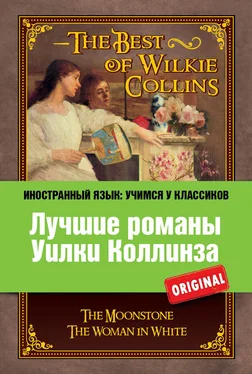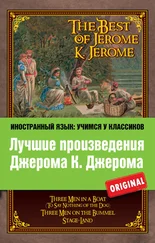I dismissed the fly a mile distant from the park, and getting my directions from the driver, proceeded by myself to the house.
As I turned into the lane from the high-road, I saw a man, with a carpet-bag, walking before me rapidly on the way to the lodge. He was a little man, dressed in shabby black, and wearing a remarkably large hat. I set him down (as well as it was possible to judge) for a lawyer’s clerk, and stopped at once to widen the distance between us. He had not heard me, and he walked on out of sight, without looking back. When I passed through the gates myself, a little while afterwards, he was not visible – he had evidently gone on to the house.
There were two women in the lodge. One of them was old, the other I knew at once, by Marian’s description of her, to be Margaret Porcher.
I asked first if Sir Percival was at the Park, and receiving a reply in the negative, inquired next when he had left it. Neither of the women could tell me more than that he had gone away in the summer. I could extract nothing from Margaret Porcher but vacant smiles and shakings of the head. The old woman was a little more intelligent, and I managed to lead her into speaking of the manner of Sir Percival’s departure, and of the alarm that it caused her. She remembered her master calling her out of bed, and remembered his frightening her by swearing – but the date at which the occurrence happened was, as she honestly acknowledged, “quite beyond her.”
On leaving the lodge I saw the gardener at work not far off. When I first addressed him, he looked at me rather distrustfully, but on my using Mrs. Michelson’s name, with a civil reference to himself, he entered into conversation readily enough. There is no need to describe what passed between us – it ended, as all my other attempts to discover the date had ended. The gardener knew that his master had driven away, at night, “some time in July, the last fortnight or the last ten days in the month” – and knew no more.
While we were speaking together I saw the man in black, with the large hat, come out from the house, and stand at some little distance observing us.
Certain suspicions of his errand at Blackwater Park had already crossed my mind. They were now increased by the gardener’s inability (or unwillingness) to tell me who the man was, and I determined to clear the way before me, if possible, by speaking to him. The plainest question I could put as a stranger would be to inquire if the house was allowed to be shown to visitors. I walked up to the man at once, and accosted him in those words.
His look and manner unmistakably betrayed that he knew who I was, and that he wanted to irritate me into quarrelling with him. His reply was insolent enough to have answered the purpose, if I had been less determined to control myself. As it was, I met him with the most resolute politeness, apologised for my involuntary intrusion (which he called a “trespass,”) and left the grounds. It was exactly as I suspected. The recognition of me when I left Mr. Kyrle’s office had been evidently communicated to Sir Percival Glyde, and the man in black had been sent to the Park in anticipation of my making inquiries at the house or in the neighbourhood. If I had given him the least chance of lodging any sort of legal complaint against me, the interference of the local magistrate would no doubt have been turned to account as a clog on my proceedings, and a means of separating me from Marian and Laura for some days at least.
I was prepared to be watched on the way from Blackwater Park to the station, exactly as I had been watched in London the day before. But I could not discover at the time, whether I was really followed on this occasion or not. The man in black might have had means of tracking me at his disposal of which I was not aware, but I certainly saw nothing of him, in his own person, either on the way to the station, or afterwards on my arrival at the London terminus in the evening. I reached home on foot, taking the precaution, before I approached our own door, of walking round by the loneliest street in the neighbourhood, and there stopping and looking back more than once over the open space behind me. I had first learnt to use this stratagem [252]against suspected treachery in the wilds of Central America – and now I was practising it again, with the same purpose and with even greater caution, in the heart of civilised London!
Nothing had happened to alarm Marian during my absence. She asked eagerly what success I had met with. When I told her she could not conceal her surprise at the indifference with which I spoke of the failure of my investigations thus far.
The truth was, that the ill-success of my inquiries had in no sense daunted me. I had pursued them as a matter of duty, and I had expected nothing from them. In the state of my mind at that time, it was almost a relief to me to know that the struggle was now narrowed to a trial of strength between myself and Sir Percival Glyde. The vindictive motive had mingled itself all along with my other and better motives, and I confess it was a satisfaction to me to feel that the surest way, the only way left, of serving Laura’s cause, was to fasten my hold firmly on the villain who had married her.
While I acknowledge that I was not strong enough to keep my motives above the reach of this instinct of revenge, I can honestly say something in my own favour on the other side. No base speculation on the future relations of Laura and myself, and on the private and personal concessions which I might force from Sir Percival if I once had him at my mercy, ever entered my mind. I never said to myself, “If I do succeed, it shall be one result of my success that I put it out of her husband’s power to take her from me again.” I could not look at her and think of the future with such thoughts as those. The sad sight of the change in her from her former self, made the one interest of my love an interest of tenderness and compassion which her father or her brother might have felt, and which I felt, God knows, in my inmost heart. All my hopes looked no farther on now than to the day of her recovery. There, till she was strong again and happy again – there, till she could look at me as she had once looked, and speak to me as she had once spoken – the future of my happiest thoughts and my dearest wishes ended.
These words are written under no prompting of idle self-contemplation. Passages in this narrative are soon to come which will set the minds of others in judgment on my conduct. It is right that the best and the worst of me should be fairly balanced before that time.
On the morning after my return from Hampshire I took Marian upstairs into my working-room, and there laid before her the plan that I had matured thus far, for mastering the one assailable point in the life of Sir Percival Glyde.
The way to the Secret lay through the mystery, hitherto impenetrable to all of us, of the woman in white. The approach to that in its turn might be gained by obtaining the assistance of Anne Catherick’s mother, and the only ascertainable means of prevailing on Mrs. Catherick to act or to speak in the matter depended on the chance of my discovering local particulars and family particulars first of all from Mrs. Clements. After thinking the subject over carefully, I felt certain that I could only begin the new inquiries by placing myself in communication with the faithful friend and protectress of Anne Catherick.
The first difficulty then was to find Mrs. Clements.
I was indebted to Marian’s quick perception for meeting this necessity at once by the best and simplest means. She proposed to write to the farm near Limmeridge (Todd’s Corner), to inquire whether Mrs. Clements had communicated with Mrs. Todd during the past few months. How Mrs. Clements had been separated from Anne it was impossible for us to say, but that separation once effected, it would certainly occur to Mrs. Clements to inquire after the missing woman in the neighbourhood of all others to which she was known to be most attached – the neighbourhood of Limmeridge. I saw directly that Marian’s proposal offered us a prospect of success, and she wrote to Mrs. Todd accordingly by that day’s post.
Читать дальше
Конец ознакомительного отрывка
Купить книгу












